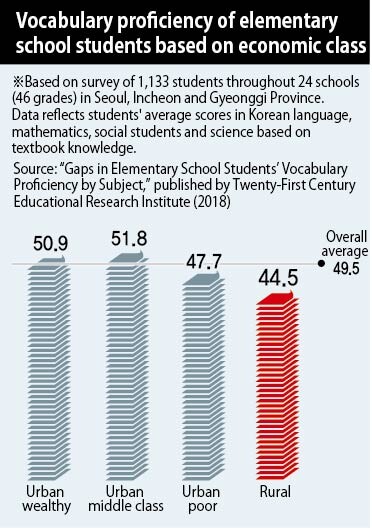hankyoreh
Links to other country sites 다른 나라 사이트 링크
Study reveals language ability largely impacted by environment and family background

Amid serious concerns that South Korean children’s Korean-language ability is getting progressively worse, an intriguing recent study finds that residential environment and family background are responsible for a substantial gap in the vocabulary of elementary school students.
This was the conclusion of a research report titled “Gaps in Elementary School Students’ Vocabulary Proficiency by Subject,” which was published at the end of last year by Twenty-First Century Educational Research Institute, affiliated with an NGO called the Educational Research and Innovation Center of Korea (ERICK). The study analyzed the vocabulary of 1,133 fifth-grade students in 46 classes at 24 elementary schools in Seoul, Incheon and Gyeonggi Province. This study found a “vocabulary gap,” in which a higher percentage of the high-scoring cohort were found in areas assessed as being more affluent and a higher percentage of the low-scoring cohort were found in less affluent areas.
The researchers divided areas of cities by the market value of apartments’ per-unit area into the following categories: rich (8.21-16.2 million won [US$7,305-14,415] per pyeong, or 3.31 square meters), middle class (3.72-7.09 million won [US$3,310-6,309]) and poor (2.4-3.04 million won [US$2,135-2,705]). After adding the degree of urbanization to the level of affluence, resulting in the additional category of rural (1 million won [US$889.76] and below), researchers tested the vocabulary of students at schools in each of these areas.
The testing, which aimed to measure students’ level of vocabulary proficiency in different subjects, assessed whether students understand terms collated from textbooks (first to fourth grade) in the subjects of Korean language, mathematics, social studies and science. The overall average score across the four subjects was 49.5 points (65 points being the maximum possible). The percentage of correct answers in each subject was 80.4% in Korean, 82% in math, 68% in social studies and 73.3% in science.
When the averages are viewed for schools categorized as rich, middle class, poor and rural (according to housing prices), rich and middle class schools scored above the overall average of 49.5, at 50.9 and 51.8, respectively, while scores at poor and rural schools were below average, at 47.7 and 44.5, respectively. Whereas only three schools in wealthy and middle class areas were below average, only one school in a poor area scored above average, and all the schools in rural areas were below average. Researchers explained that this represents an educational disparity based on level of affluence, presuming that housing value is a leading indicator of household affluence. The researchers concluded that middle-class schools’ surprising outperformance of rich schools likely reflects “the educational fervor in new housing developments outside Seoul and among middle-class parents.”
Single-parent families only accounted for 6.6% of the high-scoring cohort but 30% of the low-scoring cohort. Students in “multicultural families” – in which one of the parents is a foreigner – tended to be low, but there was also considerable variation among multicultural students, with 37% of them outscoring the overall average.
The researchers said that the disparity largely resulted from “the amount and quality of conversation with their parents, reading books, lifestyle habits and attitudes toward learning,” as well as “shortcomings in schools’ educational role.” They also suggested the need for programs “on the national and local level that will help children from low-income and single-parent families focus on reading more books and learning more vocabulary.”
By Choi Won-hyung, staff reporter
Please direct comments or questions to [english@hani.co.kr]

Editorial・opinion
![[Editorial] Intensifying US-China rivalry means Seoul must address uncertainty with Beijing sooner than later [Editorial] Intensifying US-China rivalry means Seoul must address uncertainty with Beijing sooner than later](https://flexible.img.hani.co.kr/flexible/normal/500/300/imgdb/original/2024/0517/8117159322045222.jpg) [Editorial] Intensifying US-China rivalry means Seoul must address uncertainty with Beijing sooner than later
[Editorial] Intensifying US-China rivalry means Seoul must address uncertainty with Beijing sooner than later![[Column] When ‘fairness’ means hate and violence [Column] When ‘fairness’ means hate and violence](https://flexible.img.hani.co.kr/flexible/normal/500/300/imgdb/original/2024/0516/7417158465908824.jpg) [Column] When ‘fairness’ means hate and violence
[Column] When ‘fairness’ means hate and violence- [Editorial] Yoon must stop abusing authority to shield himself from investigation
- [Column] US troop withdrawal from Korea could be the Acheson Line all over
- [Column] How to win back readers who’ve turned to YouTube for news
- [Column] Welcome to the president’s pity party
- [Editorial] Korea must respond firmly to Japan’s attempt to usurp Line
- [Editorial] Transfers of prosecutors investigating Korea’s first lady send chilling message
- [Column] Will Seoul’s ties with Moscow really recover on their own?
- [Column] Samsung’s ‘lost decade’ and Lee Jae-yong’s mismatched chopsticks
Most viewed articles
- 1[Editorial] Transfers of prosecutors investigating Korea’s first lady send chilling message
- 2[Exclusive] Unearthed memo suggests Gwangju Uprising missing may have been cremated
- 3[Column] US troop withdrawal from Korea could be the Acheson Line all over
- 4[Editorial] Intensifying US-China rivalry means Seoul must address uncertainty with Beijing sooner t
- 5Xi, Putin ‘oppose acts of military intimidation’ against N. Korea by US in joint statement
- 6[Column] When ‘fairness’ means hate and violence
- 7‘Shot, stabbed, piled on a truck’: Mystery of missing dead at Gwangju Prison
- 8China calls US tariffs ‘madness,’ warns of full-on trade conflict
- 9Seoul government announces comprehensive measures to prevent lonely deaths
- 10Records show how America stood back and watched as Gwangju was martyred for Korean democracy